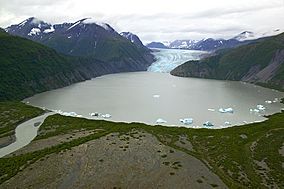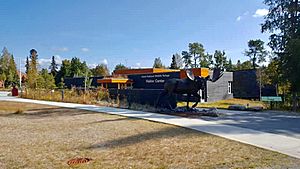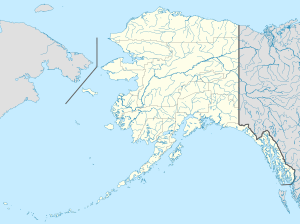Kenai National Wildlife Refuge facts for kids
Quick facts for kids Kenai National Wildlife Refuge |
|
|---|---|
|
IUCN Category IV (Habitat/Species Management Area)
|
|

Glacier and glacial lake in the Kenai National Wildlife Refuge.
|
|
| Location | Kenai Peninsula Borough, Alaska, United States |
| Nearest city | Soldotna, Alaska |
| Area | 1.92 million acres (7,770 km2) |
| Established | 1941 (as Kenai National Moose Range), 1980 (ANILCA, present status as wildlife refuge) |
| Governing body | U.S. Fish and Wildlife Service |
| Website | Kenai NWR |
The Kenai National Wildlife Refuge is a huge natural area in Alaska, United States. It's on the Kenai Peninsula, right next to Kenai Fjords National Park. This special place protects 1.92-million-acre (7,770 km2) of land.
It was first set up in 1941 to protect moose and was called the Kenai National Moose Range. Later, in 1980, it became a wildlife refuge. The refuge is managed by the U.S. Fish and Wildlife Service from offices in Soldotna.
Contents
Exploring the Kenai Refuge
The Kenai National Wildlife Refuge has many different kinds of land. You can find wet, marshy areas called muskegs, high alpine mountains, and thick taiga forests.
Amazing Animals and Plants
This refuge is home to many large animals. You might spot wolves, brown bears, black bears, and dall sheep. There are also huge moose, quick Canadian lynx, and caribou. Thousands of birds, both local and those that travel long distances, also live here.
The refuge has many lakes, including two very large ones: Skilak Lake and Tustumena Lake. The famous Kenai River also flows through it. People love to come here to fish for salmon and trout.
Fun Things to Do

There are lots of ways to explore the Kenai National Wildlife Refuge. It's a great place for outdoor adventures!
Boating and Camping Adventures
The refuge has several places where you can launch a boat and set up camp. There are two main campgrounds at Hidden Lake and Skilak Lake. You can reach both from the Skilak Lake Loop Road. Other simpler campsites are also available, and some don't even require a fee.
Since 2005, the refuge has offered 16 cabins for people to rent. Some of these cabins can only be reached by boat, making for a unique experience!
Canoe Trails for Exploration
The Kenai National Wildlife Refuge has many small canoe routes that connect different lakes. There are also two much larger canoe trails. These trails link big networks of lakes and rivers, often needing you to carry your canoe between water bodies.
The most popular trail is the Swan Lake Canoe Trail. It's about 60 miles long. The longest trail is the Swanson River Canoe Route, which stretches for 80 miles.
Hiking and Exploring Trails
There are over 110 miles of hiking trails in the refuge. You can find trails for all skill levels. Some are tough, multi-day hikes into the wild. Others are easy, short walks on paved paths. You can access these trails from different roads and campgrounds, and from the refuge visitor center.
Hunting in the Refuge
Like many national wildlife refuges, the Kenai National Wildlife Refuge allows hunting. However, there are certain rules and areas where hunting is restricted.
Wildfires and Nature's Cycle
Wildfires that start naturally are actually helpful for the forest in the long run. They help new plants grow and keep the forest healthy. Because of this, some areas of the refuge allow fires to burn naturally. This happens as long as the fires are not moving towards towns or refuge buildings.
Sometimes, bigger fires happen. In 2014, a fire called the Funny River Fire started because of people. During the efforts to put out this fire, some wolf pups were found and rescued. These five pups were taken to the Alaska Zoo and later moved to the Minnesota Zoo.
In 2019, a large lightning-caused fire called the Swan Lake Fire burned a lot of land. It was allowed to burn for a while. But when it started to threaten nearby towns and roads, firefighters worked hard to stop it. Even though a lot of land burned, no buildings or lives were lost.
Images for kids
-
A taiga forest section of the Seven Lakes trail.
-
Trumpeter swans on Lower Ohmer Lake.
-
Dolly Varden and Rainbow trout fry in one of the refuge's many lakes.
 | William Lucy |
 | Charles Hayes |
 | Cleveland Robinson |












